
My Generation is the debut studio album by English rock band the Who, released on 3 December 1965 by Brunswick Records in the United Kingdom, and Festival Records in Australia. In the United States, it was released on 25 April 1966 by Decca Records as The Who Sings My Generation, with a different cover and a slightly altered track listing. Besides the members of the Who, being Roger Daltrey (vocals), Pete Townshend (guitar), John Entwistle (bass) and Keith Moon (drums), the album features contributions by session musician Nicky Hopkins (piano).

Stations of the Crass is the second album by Crass, released in 1979. The record, originally released as a double 12", includes live tracks from a gig recorded at the Pied Bull pub in Islington, London, on 7 August 1979. The first three sides contain the studio tracks and play at 45 rpm, while the final side comprises the live material and plays at 33 rpm. The album's title is not only a pun on the Catholic rite of the Stations of the Cross, but is also a reference to the graffiti campaign that the band had been conducting around London's underground railway system, the cover artwork depicting a wall at Bond Street tube station that had allegedly been 'decorated' by them. Although the album met mixed critical reception at first, it managed to sell at least 20,000 copies within two weeks.

Penis Envy, released in 1981, was the third LP by the anarchist punk band Crass. The album was included at #36 on Rolling Stone's "40 Greatest Punk Albums of All Time" list in 2016.

Little Games is the fourth American album by English rock band the Yardbirds. Recorded and released in 1967, it was their first album recorded after becoming a quartet with Jimmy Page as the sole guitarist and Chris Dreja switching to bass. It was also the only Yardbirds album produced by Mickie Most.

"Money" is a song by English rock band Pink Floyd from their 1973 album The Dark Side of the Moon. Written by Roger Waters, it opened side two of the original album. Released as a single, it became the band's first hit in the United States, reaching number 10 in Cash Box magazine and number 13 on the Billboard Hot 100.

Third is the third album by American rock band Big Star. The sessions started at Ardent Studios in September 1974. Though Ardent created promotional, white-label test pressings for the record in 1975, a combination of financial issues, the uncommercial sound of the record, and lack of interest from singer Alex Chilton and drummer Jody Stephens in continuing the project prevented the album from ever being properly finished or released at the time of its recording. It was eventually released in 1978 by PVC Records.

Apostrophe (') is the sixth solo album and eighteenth in total by Frank Zappa, released in March 1974 in both stereo and quadraphonic formats. An edited version of its lead-off track, "Don't Eat the Yellow Snow", was the first of Zappa's three Billboard Top 100 hits, ultimately peaking at number 86. The album itself became the biggest commercial success of Zappa's career, reaching number 10 on the US Billboard 200.
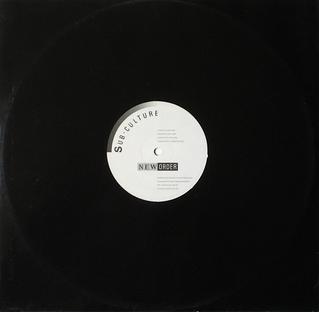
"Sub-culture" is a song by English rock band New Order. It was released as the second and final single from their third studio album, Low-Life (1985) on 28 October 1985 by Factory Records.

Wild Life is the debut studio album by the British-American rock band Wings and the third studio album by Paul McCartney after the breakup of the Beatles. The album was mainly recorded in seven sessions between 24 July and 4 September 1971, at EMI Studios by McCartney, his wife Linda, session drummer Denny Seiwell, whom they had worked with on the McCartneys' previous album Ram, and guitarist Denny Laine, formerly of the English rock band the Moody Blues. It was released by Apple Records on 7 December in the UK and US, to lukewarm critical and commercial reaction.

Wide Awake in America is a four-track extended play by Irish rock band U2. It was released on 20 May 1985 through Island Records. It combines two live performances of songs from the group's 1984 album The Unforgettable Fire with two B-sides from the era, which had previously been available only in the United Kingdom. Wide Awake in America was originally released only in North America and Japan but it charted in the UK as an import. It was re-released internationally in 1990.

"Distant Lover" is the sixth song issued on singer Marvin Gaye's 1973 album, Let's Get It On and the B-side of the second single from that album, "Come Get to This". A live recording was issued as a single in 1974. The live version of the song was Gaye's most successful single during the three-year gap between Let's Get It On and his following 1976 album, I Want You.

Obscure Alternatives is the second studio album by English new wave band Japan, released in October 1978 by record label Hansa.
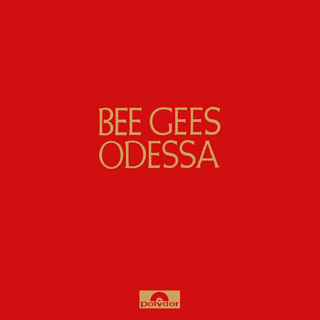
Odessa is the sixth studio album by the Bee Gees, a double vinyl LP released in February 1969, initially in an opulent red flocked cover with gold lettering. Despite reaching the UK Top Ten and the US Top 20, the album was not particularly well-received, though now is regarded by many as the most significant of the group's Sixties albums. An ambitious project, originally intended as a concept album on the loss of a fictional ship in 1899, it created tension and disagreements in the band regarding the work's direction; finally, a dispute over which song to release as a single led to Robin Gibb temporarily leaving the group.

Marcus Garvey is the third album by reggae artist Burning Spear, released in 1975 on Fox Records in Jamaica and then internationally on Island Records later in the year. The album is named after the Jamaican National Hero and Rastafari movement prophet Marcus Garvey. A dub version of it was released four months later as Garvey's Ghost.
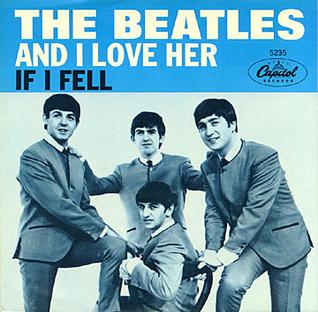
"And I Love Her" is a song recorded by English rock band the Beatles, written primarily by Paul McCartney and credited to the Lennon–McCartney partnership. It is the fifth track of their third UK album A Hard Day's Night and was released 20 July 1964, along with "If I Fell", as a single release by Capitol Records in the United States, reaching No. 12 on the Billboard Hot 100.
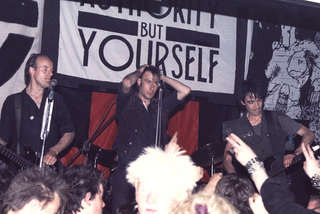
Crass were an English art collective and punk rock band formed in Epping, Essex in 1977, who promoted anarchism as a political ideology, a way of life, and a resistance movement. Crass popularised the anarcho-punk movement of the punk subculture, advocating direct action, animal rights, feminism, anti-fascism, and environmentalism. The band used and advocated a DIY ethic in its albums, sound collages, leaflets, and films.

Hollies Sing Hollies is the ninth studio album released in the UK by the Hollies. It was released in November 1969 by Parlophone. It was their second album that year, coming 6 months after an entire album of Bob Dylan covers. It was their first album of original compositions since the departure of Graham Nash. It was also the second album by the Hollies to feature Terry Sylvester and the first to feature his compositions, as well as an instrumental by bassist Bernie Calvert. The US version, titled "He Ain't Heavy, He's My Brother", included the hit single of the same name, while omitting the tracks "Soldier's Dilemma" and "Marigold: Gloria Swansong". The UK album did not chart, but its US version peaked at number 32.
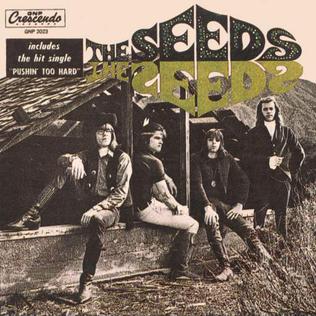
The Seeds is the debut album by American garage rock band the Seeds. It was released in April 1966 through GNP Crescendo Records and produced by Sky Saxon. After the release of two singles in 1965, "Can't Seem to Make You Mine" and "Pushin' Too Hard", the album was released and charted in the United States where it peaked at No. 132 on the Billboard Top LPs & Tapes chart. Modern reception of the album is positive, with Malcolm Russel noting the band's influence on CBGB musicians a decade later.

Never Before is a compilation album by the American rock band the Byrds, consisting of previously unreleased outtakes, alternate versions, and rarities. It was initially released by Re-Flyte Records in December 1987 and was subsequently reissued on CD in 1989, with an additional seven bonus tracks.

Gravity's Rim (Instrumental Version) is a studio album by Vampire Rodents, released on July 20, 2018, by Rodentia Productions. It contains non-vocal versions of tracks from Vampire Rodents sixth studio album Gravity's Rim, including the tracks "Blind Acceleration", originally from the 1996 various artists compilation album Fascist Communist Revolutionaries, and "Smartass", an unreleased track listed on the album's back cover as its coda. Composer Daniel Vahnke had originally planned to issue the music on compact disc in late 1996 or early in 1997 but Fifth Colvmn Records went bankrupt and album's release date was cancelled.





















